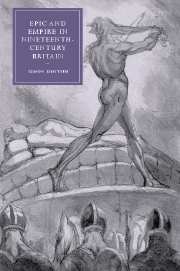Book contents
- Frontmatter
- Contents
- Acknowledgements
- Introduction
- 1 Homer, Ossian and Modernity
- 2 Walter Scott and Heroic Minstrelsy
- 3 Epic Translation and the National Ballad Metre
- 4 The Matter of Britain and the Search for a National Epic
- 5 ‘As Flat as Fleet Street’: Elizabeth Barrett Browning, Matthew Arnold and George Eliot on Epic and Modernity
- 6 Mapping Epic and Novel
- 7 Epic and the Imperial Theme
- 8 Kipling, Bard of Empire
- 9 Epic and the Subject Peoples of Empire
- 10 Coda: Some Homeric Futures
- Notes
- Bibliography
- Index
- CAMBRIDGE STUDIES IN NINETEENTH-CENTURY LITERATURE AND CULTURE
3 - Epic Translation and the National Ballad Metre
Published online by Cambridge University Press: 22 September 2009
- Frontmatter
- Contents
- Acknowledgements
- Introduction
- 1 Homer, Ossian and Modernity
- 2 Walter Scott and Heroic Minstrelsy
- 3 Epic Translation and the National Ballad Metre
- 4 The Matter of Britain and the Search for a National Epic
- 5 ‘As Flat as Fleet Street’: Elizabeth Barrett Browning, Matthew Arnold and George Eliot on Epic and Modernity
- 6 Mapping Epic and Novel
- 7 Epic and the Imperial Theme
- 8 Kipling, Bard of Empire
- 9 Epic and the Subject Peoples of Empire
- 10 Coda: Some Homeric Futures
- Notes
- Bibliography
- Index
- CAMBRIDGE STUDIES IN NINETEENTH-CENTURY LITERATURE AND CULTURE
Summary
MACAULAY, MAGINN AND THE NATIONAL BALLAD METRE
Scott's relationship to popular poetry in The Lay of the Last Minstrel and The Lady of the Lake was partly conditioned by his own activity as collector and editor of ballads in Minstrelsy of the Scottish Border in 1802–3; this volume is itself one of the key documents in the revival of interest in traditional and non-elite forms that dates from Percy's Reliques of Ancient English Poetry in 1765. This important cultural current is contemporaneous with the developing Homeric controversy and shares some of the same assumptions. If the Homeric epics were made up of a combination of earlier lays, then those lays were presumably the equivalent of the ballads being rediscovered on the Borders. More than this; just as the Iliad emerged from an earlier, heroic, stage of human society, so the ballads too came out of the rough and primitive conditions of a society dominated by violence, feuding and warfare. This suggestive equivalence between the Border ballads and the pre-Homeric lays became the basis for a style of Homeric translation whose most notorious practitioner was Francis Newman.
Newman's predecessor in this line was the Irish author and journalist William Maginn; his Homeric Ballads, originally published in Fraser's Magazine (which he founded), were republished together, posthumously, in 1850.
- Type
- Chapter
- Information
- Epic and Empire in Nineteenth-Century Britain , pp. 48 - 63Publisher: Cambridge University PressPrint publication year: 2006



